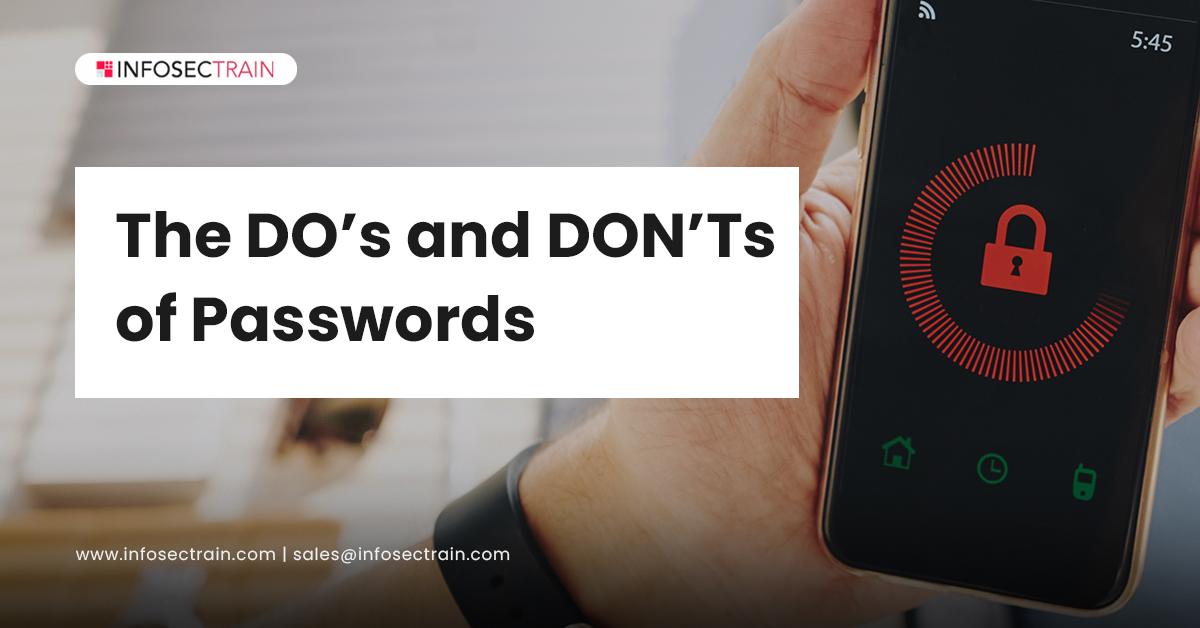The DOs and DON’Ts of Passwords
Passwords are the foundation of security and are required for almost everything. It’s now essential for your email, bank accounts, and digital gadgets, among other things. It might be terrible if your personal or private information fell into the wrong hands. Always remember your password is as valuable as your identity.

With the growing digital world, passwords have become an integral part of our lives but, it can be commonly seen that sometimes we do not tend to give much importance to passwords. Generally, we think ‘what could I have that a hacker would want’, and end up setting weak passwords. We also practice using the same password for all our accounts merely because it is comparatively convenient to remember. This way, if a hacker gets his hands on one password, he has access to your entire digital existence, which is why password security is so crucial. To avoid being a victim of cybercrime or malware, you should choose your password very wisely.
Some common mistakes with passwords:
- Setting a password of the minimum required length
- Choosing an easily predictable password like ‘123456’, ‘qwerty’, or ‘abcdef’
- Choosing birthday, anniversaries, or other such personal information for your password
- Choosing names of people related to you
- Sharing your password with friends and family
- Not updating passwords on a regular basis
- Saving the passwords of important accounts in easily approachable places
Don’t
Here is a list of things that you shouldn’t do with your passwords:
- Don’t use the word ‘Password’ or any permutations and combinations of it. For e.g.- Some people tend to keep ‘P@ssw0rd’ as their password. It is equally unsafe.
- Avoid the use of common one-word for passwords like morning, flowers, friends, etc.
- Don’t use the same password for all of your accounts.
- Passwords should not be shared. Also, don’t stick them to your computer on a piece of paper.
- Don’t use apparent patterns like 111111, abc123, or 654321, or typical keyboard patterns like asdfghjkl or qwerty.
- Special characters like @,!, 0, etc. should not be used just at the beginning or end of the password.
- Just because you have 2FA, don’t believe a weaker password is safer.
- Personal information such as your birthdate, residence, or family members’ names should not be included.
Do
- You must use long passwords, made up of two or more unrelated words. Use numerals or special characters as well, but don’t rely on the overused and well-known substitutions @ for a and 3 for e.
- Make sure that your passwords are at least eight characters long. Aim for a character count of 12-15.
- Make use of a blend of capital and lowercase characters, numerals, and symbols.
- Include weird terms that only you would understand. Other people should think it’s absurd.
- Keep your passwords safe and secure by encrypting them in a password manager.
- Ensure that your password has both numbers and letters.
- Make sure that each of your accounts has its own set of passwords that are both unique and complicated.
- Use two-factor authentication (2FA) to add an extra layer of protection, especially for your primary email account.
Passwords are a way for a user to authenticate that they have permission to access a computer. Multiple users can share a single device, each with its own password. A password functions similarly to a lock and key system. Only the person having the key will be able to enter.
Password guessing is one of the most prevalent techniques for hackers to get access to computers. Intruders can quickly acquire access and control of a digital device using simple and widely used passwords. Hackers will be unable to break into a system with a strong password, forcing them to hunt for another victim. The more complicated the password, the less likely one is to be a victim of such an unwelcome incursion.
Computing devices can communicate with one another and share information, and they can also communicate with banks to make financial transactions in many circumstances. Because all of these workstations are at risk of being hacked by unauthorized users, users should always use strong passwords to safeguard them.
Just like Donna Paulsen claims that if Harvey Spector ever had her, he wouldn’t wanna share her, the same way you should never share your passwords with anyone. No matter how close the person is, a password is like a toothbrush. Everybody owns one and you never share yours.






 1800-843-7890 (India)
1800-843-7890 (India)